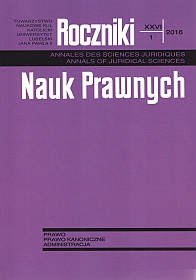Blessed Charles of Austria-Hungary (1887-1922). Christian politician in service of nation and family
Abstract
Charles of Austria-Hungary was born in Persenbeug Castle near Dunay river on September 17th 1887. He was a son of archduke Otton (1865-1906) and Princess Maria Josepha of Saxony (1867-1944). He was raised as the Catholic spirit and was carefully prepared to be a future emperor. On November 21st , 1916 he become the Emperor of the Austria, and later the King of Hungary. At age 24, he married a princess Zyta of Bourbon (1892-1989), with whom he had eight children.
The aim of this article is the characteristic of law, administrative and social reforms of the Emperor Charles of Austria-Hungary (inter alia: in the field of labour law, social security; public safety; health care; improving the legal and financial situation of families, soldiers, prisoners and war veterans). Confrontation of these issues with Leo XIII's encyclical Rerum Novarum and presentation of Charles of Austria-Hungary as a Christian politician who promoted peace, a role-model husband and good father.
Due to cultivating social spirit, understanding the power as a sacred service to the nations and implementation of the vocation to holiness in family life and in the political activity he was beatified by John Paul II the Pope on October 3st 2004. He pointed him as an example to follow and social responsibility for those “who bear the burden of political responsibility in Europe today”.
References
Broucek Peter, Kaiser Karl als Staatsmann. Eine biographische Skizze, [w:] Jan Mikrut (Hrsg.), Kaiser Karl I. (IV.) als Christ, Staatsmann, Ehemann und Familienvater, Dom Verlag, Wien 2004, s. 91-114.
Brizi Giovanna, Das religiöse Leben des Kaisers Karl. Studium der Akten zum Seligsprechungsprozess, [w:] Jan Mikrut (Hrsg.), Kaiser Karl I. (IV.) als Christ, Staatsmann, Ehemann und Familienvater, Dom Verlag, Wien 2004, s. 35-90.
Demmerle Eva, Kaiser Karl I. „Selig, die Frieden stiften...“ die Biographie, Amalthea, Wien 2004.
Dyduch Jan, Polityka jako wyraz służby człowiekowi, „Polonia Sacra” 16(2012), nr 31 (75), s. 5-39.
Engel-Janosi Friedrich, Über den Friedenswillen Kaiser Karls, [w:] Jan Mikrut (Hrsg.), Kaiser Karl I. (IV.) als Christ, Staatsmann, Ehemann und Familienvater, Wien 2004, s. 533-548.
Feigl Erich, Ein sozial denkender Kaiser und seine Maßnahmen, [w:] Jan Mikrut (Hrsg.), Kaiser Karl I. (IV.) als Christ, Staatsmann, Ehemann und Familienvater, Dom Verlag, Wien 2004, s. 139-172.
Feigl Erich, Kaiser Karl I.: ein Leben für den Frieden seiner Völker, Amalthea, Wien 1990.
Fiejdasz Lidia, Wzory odpowiedzialności społecznej w polityce, „Teka Komisji Prawniczej. Polska Akademia Nauk Oddział w Lublinie” 6(2013), s. 48-59.
Griesser-Pečar Tamara, Karl und Zita – Ihr kurzes Eheleben in einer schwierigen Zeit, [w:] Jan Mikrut (Hrsg.), Kaiser Karl I. (IV.) als Christ, Staatsmann, Ehemann und Familienvater, Dom Verlag, Wien 2004, s. 201-244.
Habacher M., Die Geschichte des Seligsprechungsprozess und der religiösen Verehrungsformen des Dieners Gottes Karl von Habsburg, [w:] Jan Mikrut (Hrsg.), Kaiser Karl I. (IV.) als Christ, Staatsmann, Ehemann und Familienvater, Dom Verlag, Wien 2004, s. 257-264.
Kucharczyk Grzegorz, Ostatni cesarz. Bł. Karol I Habsburg, Klub Książki Katolickiej, Poznań 2004.
Macek Bernhard A., Kaiser Karl I.: der letzte Kaiser Österreichs: ein biografischer Bilderbogen, Sutton Verlag, Erfurt 2014.
Misztal Henryk, Świeccy święci i błogosławieni, wyd. II uzupełnione i poszerzone, Wydawnictwo Diecezjalne i Drukarnia w Sandomierzu, Lublin–Sandomierz 2002.
Misztal Henryk, Święci a przyszłość Europy, [w:] Piotr Stanisz (red.), „Religioni et scientiae”. Materiały V Sympozjum Prawa Kanonizacyjnego (Lublin, 25 kwietnia 2001 r.), Lublin 2001, s. 175-208.
Pyzdek Tadeusz, Die Christliche Gesellschaftslehre als eine Orientierung in den sozial politischen Bemühungen von Kaiser Karl I, [w:] Jan Mikrut (Hrsg.), Kaiser Karl I. (IV.) als Christ, Staatsmann, Ehemann und Familienvater, Dom Verlag, Wien 2004, s. 425-431.
Szubert Tomasz, Zabiegi cesarza i króla Karola I. (IV.) o pokojowe zakończenie pierwszej wojny światowej, w świetle literatury austriackiej, „Rocznik Tarnowski” 15(2010), s. 39-44.
Świdziński Jerzy Adam, Święci władcy. Leksykon, Wydawnictwo Salwatorów, Kraków 2009.
Winkler G.B., Die Bedeutung der christlichen Tugenden in Leben Kaiser Karls, [w:] Jan Mikrut (Hrsg.), Kaiser Karl I. (IV.) als Christ, Staatsmann, Ehemann und Familienvater, Dom Verlag, Wien 2004, s. 503-512.
Zarych Elżbieta, Karol I Habsburg. Chrześcijański cesarz końca monarchii, eSPe, Kraków 2015.
Copyright (c) 2016 Roczniki Nauk Prawnych

This work is licensed under a Creative Commons Attribution-NonCommercial-NoDerivatives 4.0 International License.


